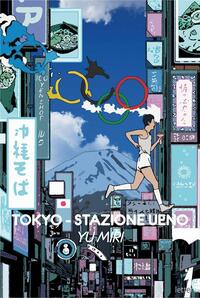Take a photo of a barcode or cover
emotional
reflective
sad
fast-paced
Plot or Character Driven:
A mix
Strong character development:
Complicated
Loveable characters:
N/A
Diverse cast of characters:
N/A
Flaws of characters a main focus:
Complicated
dark
emotional
sad
medium-paced
Plot or Character Driven:
Character
Strong character development:
No
Loveable characters:
N/A
Diverse cast of characters:
No
Flaws of characters a main focus:
Yes
informative
reflective
sad
medium-paced
Plot or Character Driven:
A mix
Strong character development:
No
Loveable characters:
Yes
Diverse cast of characters:
No
Flaws of characters a main focus:
No
Tokyo Ueno Station is told from the point of view of a ghost. We alternate between his observations of people around him with memories of his life story. He lived in varying degrees of poverty. Occasionally, the main character’s life is influenced by the Emperor of Japan.
This short book is sad and almost poetic.
This short book is sad and almost poetic.
reflective
sad
slow-paced
Plot or Character Driven:
Character
I spent almost two weeks with this book, not because it was long but but because the weight of its sadness stayed with me long after I closed each chapter.
It is deeply sorrowful, quietly devastating. Kazu’s life runs parallel to the imperial family. So close, yet worlds apart. His son was born on the same day as the Crown Prince, a detail that feels almost cruel in its symbolism. His work on the Olympic construction sites meant to usher in national pride, only highlights how invisible he truly was.
The novel draws a contrast between two lives, two Japans: one exalted, the other discarded. It left me feeling hollow and heavy, like I had witnessed something quietly tragic and unbearably real.
It’s a melancholic reflection on grief, displacement, and the quiet suffering so many endure without being seen.
The novel draws a contrast between two lives, two Japans: one exalted, the other discarded. It left me feeling hollow and heavy, like I had witnessed something quietly tragic and unbearably real.
It’s a melancholic reflection on grief, displacement, and the quiet suffering so many endure without being seen.
This book is beautifully written. It is the story of a man born in 1933, the same year as the Japanese Emperor, which should have been a lucky omen. However the narrator, Kazu, is actually a dead ghost, trapped in Ueno Train Station and park. He narrates his family’s personal story about poverty, loss and homelessness, and the hidden inequalities in the big, beautiful, colorful metropolis of Tokyo, and how Ueno Station also became a refuge for the homeless during the Fukushima nuclear meltdown and Tsunami. A very sweet little book, Miri Yū won the 2020 National Book Award for Tokyo Ueno Station. She also owns a bookstore in Fukushima called Full House, and runs it out of her own home!
So sad, the stories of his homelessness and losing his family hit hard and then leaving so as to not be a burden on his daughter’s family?? oh man. 4/5 stars, there was a lot of context with religion and with Japan that I am simply unfamiliar with but still a good sad book
challenging
emotional
informative
mysterious
reflective
sad
slow-paced
Plot or Character Driven:
Character
Strong character development:
No
Loveable characters:
Complicated
Diverse cast of characters:
No
I just don’t think this is my kind of book, it was pretty much alot of prose and exposition and not a lot of plot
reflective
sad
tense
fast-paced
Plot or Character Driven:
Character
Strong character development:
No
Loveable characters:
Complicated
Diverse cast of characters:
Yes
Flaws of characters a main focus:
Yes
I don’t think I entirely enjoyed it but it was a good thing to read and a new experience






